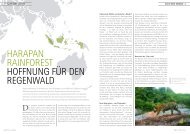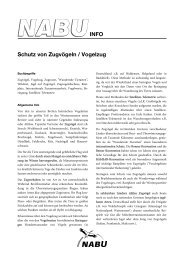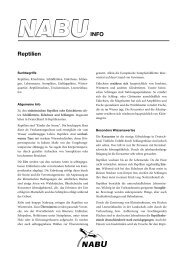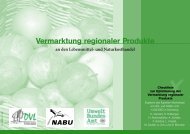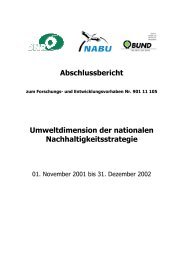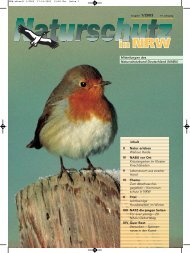Studie "The GMO-emperor has no clothes" (engl.) - Nabu
Studie "The GMO-emperor has no clothes" (engl.) - Nabu
Studie "The GMO-emperor has no clothes" (engl.) - Nabu
Create successful ePaper yourself
Turn your PDF publications into a flip-book with our unique Google optimized e-Paper software.
A second reason why GM crops are <strong>no</strong>t feeding<br />
the hungry is because they are feeding animals<br />
and cars instead. <strong>The</strong> overwhelming majority of<br />
GM crops are grown for either animal feed or to<br />
produce biofuels. In large part, this is because<br />
e<strong>no</strong>rmous profits can be made from crops that<br />
feed into an industrialized model of agriculture.<br />
Small-scale, agroecological farm systems that<br />
grow food locally for local consumption are<br />
systems of self-sufficiency and do <strong>no</strong>t fit into an<br />
industrial, market-based paradigm.<br />
Third, GM crops are an extension of the current<br />
industrial model that fails to recognize that<br />
hunger is fundamentally a problem of poverty,<br />
food distribution, and inequity. Even though we<br />
currently grow e<strong>no</strong>ugh food to feed the world,<br />
more than one billion people still go hungry.<br />
E<strong>no</strong>ugh food is available to provide at least 4.3<br />
pounds of food per person per day worldwide:<br />
this consists of two and a half pounds of grain,<br />
beans, and nuts, about a pound of fruits and<br />
vegetables, and nearly a<strong>no</strong>ther pound of meat,<br />
milk, and eggs. 2<br />
Food security begins with equitable and fair<br />
access to land and vital natural resources. <strong>The</strong><br />
current system of relying on global markets<br />
and import/export models <strong>has</strong> dismantled food<br />
security at the household level where it must<br />
begin. Agroecological systems provide the multifunctionality<br />
and self-reliance that will ensure<br />
plentiful and equal access to food and water.<br />
Fourth, proponents of GM seeds and crops either<br />
do <strong>no</strong>t realize—or do <strong>no</strong>t ack<strong>no</strong>wledge—that,<br />
in contrast to the high-tech, very costly <strong>GMO</strong><br />
industrial system, there are viable, low-cost<br />
farming methods that better guard against hunger<br />
and poverty. Vigorous research demonstrates that<br />
agroecological, organic methods of farming can<br />
produce yields equal to or greater than industrial<br />
agriculture yields. “Model estimates indicate that<br />
organic methods could produce e<strong>no</strong>ugh food<br />
on a global per capita basis to sustain the current<br />
human population, and potentially an even larger<br />
population without increasing the agricultural<br />
land base,” states a report based on a long-term,<br />
comprehensive global research project. 3<br />
Based on 293 test cases, the research found<br />
that, in developing countries, organic methods<br />
produced 80 percent higher yields than industrial<br />
farms. 4<br />
A recent study by the United Nations Special<br />
Rapporteur on the Right to Food reported that<br />
agroecological systems doubled crop yields over a<br />
period of three to 10 years in field tests conducted<br />
in 20 African countries. 5 <strong>The</strong> report also cites<br />
numerous other studies confirming high yields<br />
and reduced chemical use in other regions of the<br />
world due to agroecological farming methods.<br />
Common Threads, Common Visions<br />
Countries and regions discussed in this report<br />
each have distinct experiences with <strong>GMO</strong>s,<br />
however, there is a common thread to all of the<br />
stories. <strong>The</strong> main theme is that even though<br />
citizens in every country, in poll after poll, clearly<br />
express that they do <strong>no</strong>t want <strong>GMO</strong> products,<br />
most government leaders insist on supporting<br />
this tech<strong>no</strong>logy and even work to <strong>has</strong>ten adoption<br />
of GM seeds and crops.<br />
Why are so many governments working<br />
to contravene the desires of their citizens?<br />
<strong>The</strong> collusion between governments and<br />
biotech<strong>no</strong>logy corporations is manifested through<br />
various tactics. Lobbying, marketing, funding<br />
science, education, and research institutions,<br />
“revolving door” political influence, and<br />
blatant disregard for the law are all exposed in<br />
these reports. <strong>The</strong>se reports illuminate the<br />
omnipresence of the industry.<br />
As <strong>no</strong>ted in the report from the U.S., the<br />
leading proponent of GM crops—top food and<br />
agricultural biotech<strong>no</strong>logy firms spent more than<br />
$547 million lobbying Congress between 1999<br />
and 2009. In addition to lobbying efforts, the<br />
biotech<strong>no</strong>logy industry <strong>has</strong> made more than $22<br />
million in political campaign contributions since<br />
1999. 6<br />
Additionally, there is a “revolving door” spinning<br />
out of control as many former employees of<br />
the biotech<strong>no</strong>logy industry are <strong>no</strong>w working<br />
2<br />
Holly Poole-kavana, 12 Myths About Hunger, backgrounder, 12 (2), oakland: Food First, 2006, http://www.foodfirst.org/<br />
sites/www.foodfirst.org/files/pdf/Bg%20SU06%2012%20Myths%20 About%20Hunger.pdf.<br />
3<br />
Catherine Badgley et al., Organic Agriculture and the Global Food Supply, Cambridge Journals, 9 June 2006,<br />
Introduction, doi:10.1017/S1742170507001640.<br />
4<br />
Ibid.<br />
5<br />
Olivier De Schutter, Food Commodities Speculation and Food Price Crises, issue brief, Geneva, Switzerland: United<br />
Nations, 2010, p. 1-2, http://www.srfood.org/images/stories/pdf/otherdocuments/20102309_briefing_<strong>no</strong>te_02_en.pdf<br />
(accessed 18 January 2011).<br />
6<br />
http://documents.foodandwaterwatch.org/BiotechLobbying-web.pdf<br />
28



